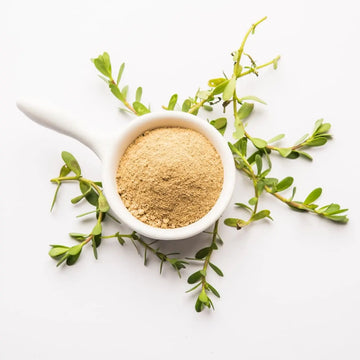Brahmi, also known as Bacopa monnieri or small-leafed bacopa, has inspired Ayurvedic practitioners with its extraordinary power for thousands of years. It is one of nature’s botanical gifts that connects the worlds of spirit and mind, bringing relief, clarity of thought, and inner strength. In today’s times of information overload and stress from overstimulation, Brahmi is coming back into favor—not as an exotic relic, but as a practical, scientifically proven support for everyday functioning.
Let's dive into the story of Brahmi - an adaptogenic plant with small leaves that, from the fathers of Ayurveda to modern neuroscientists, remains one of the most valuable allies of the mind and emotions.
In this article you will read
Introduction to Brahmi (Bacopa monnieri): Spiritual and Historical Significance
Brahmi (Bacopa monnieri) has held a special place in Ayurveda for centuries — not only as a plant supporting memory, but above all as a herb of awareness, silence of the mind and spiritual transformation. Its name comes from the word "Brahman", which in Vedic philosophy means the absolute, infinite consciousness, supreme existence. No wonder that in ancient India, Brahmi was considered a gift from the gods to those who wanted to rise above the limitations of the ordinary mind.
In traditions such as Charaka Samhita and Sushruta Samhita, Brahmi is described as a medhya rasayana – a rejuvenating elixir of the mind. Its regular use was believed to strengthen memory ( smriti ), the ability to understand ( buddhi ) and emotional stability ( dhi ). Brahmi was also credited with the power to harmonize all three doshas, and especially to alleviate Vata disorders, which are responsible for restlessness, insomnia and mental distraction.
“Brahmi tones the nervous system, aids intelligence, brings peace and illuminates the mind.”
– Bhava Prakasha, a classic Ayurvedic text
In ancient ashrams, Brahmi was given to students before learning the Vedas, so that the mind would become as receptive as a clear lake. Yogis, on the other hand, reached for Brahmi before practicing meditation and pranayama, believing that the herb helped to transcend the boundaries of everyday thinking and enter a state of deep concentration.
The modern world, although seemingly so far removed from the spiritual traditions of India, experiences similar challenges: overstimulation, stress, distraction. This is why Brahmi – this ancient wisdom hidden in a plant – is more relevant today than ever before.
Bacopa monnieri chemical composition: bacosides, flavonoids and other treasures of nature
Brahmi (Bacopa monnieri) owes its extraordinary power of action to its unique phytochemical composition. It is the presence of specific active substances that make this small aquatic plant an adaptogenic treasure of Ayurveda, and today also an object of fascination for scientists.
The main active ingredients of Bacopa monnieri are:
-
Bacosides (Bacoside A and B) – key compounds responsible for Brahmi’s neuroprotective properties. Studies show that bacosides support neuronal regeneration, improve nerve signal transmission, and protect the brain from oxidative stress-induced damage.
Alkaloids – natural compounds with a calming effect and harmonizing the nervous system.
Saponins – supporting body cleansing and absorption of nutrients.
Flavonoids – powerful antioxidants that help fight free radicals, delaying the aging processes of nerve cells.
Phytosterols – supporting the proper functioning of the immune system.

Interestingly, none of these substances work in isolation. Ayurveda emphasizes that Brahmi works on the principle of synergy – all of its active ingredients support each other, creating adaptogenic and holistic support for the body, mind and emotions.
Brahmi is also unique in that its chemical composition is responsible for its tonic, not stimulating, effect . This means that instead of artificially stimulating the nervous system, Brahmi strengthens it in a deep and long-term way – without the effect of exhaustion.
This subtle, yet powerful nature of Brahmi makes it one of the safest and most valuable adaptogens for those seeking balance in times of overstimulation and stress.
Adaptogenic properties of Brahmi (Bacopa monnieri): mechanisms of action on the nervous system and emotions
The adaptogenicity of Brahmi (Bacopa monnieri) is not accidental. It is the result of the unique effect of this plant on the nervous, hormonal and emotional systems of humans. In Ayurveda, it has been believed for centuries that Brahmi "calms the troubled waters of the mind" - and today science can explain this effect at the molecular level.
Effects on neurotransmitters and memory
Brahmi works by increasing the level of acetylcholine – one of the main neurotransmitters responsible for memory processes and concentration. Thanks to this, it improves the speed of information processing, learning ability and long-term memory. Studies show that bacosides contained in Brahmi increase the activity of acetylcholine synthase and improve the integrity of neuronal cell membranes.
In practice, this means not only better recall of facts, but also easier retrieval of information and greater mental clarity — traits that are especially desirable in today's distraction-filled world.
Stress reduction and HPA axis regulation
Brahmi's adaptogenic properties are also related to its ability to modulate the hypothalamic-pituitary-adrenal (HPA) axis, which is responsible for the body's response to stress. Brahmi lowers cortisol levels , thereby reducing feelings of anxiety, irritability and mental tension. It acts as a natural emotional shock absorber - strengthening internal resistance and the ability to adapt to changing conditions.
In Ayurveda, Brahmi is said to "bring peace to the heart" ( manas shantikara ), harmonizing not only the mind but also the subtle emotional layers of the person.
Neuroprotection and antioxidant support for the brain
Brahmi has strong antioxidant properties. It protects brain cells from oxidative stress and damage caused by free radicals. Thanks to this, it has a neuroprotective effect - it slows down the aging processes of the brain and can help prevent neurodegenerative diseases such as Alzheimer's.
Importantly, this effect is gentle and long-lasting. Regular use of Brahmi does not cause quick energy spikes or drops, but systematically strengthens the nervous system, regenerating it from the inside.
Brahmi in Classical Ayurveda: The Plant of Wisdom and Peace
In Ayurveda, Brahmi (Bacopa monnieri) is not just an adaptogen or a memory-enhancing plant. It is primarily a medhya rasayana — a rejuvenating nectar for the mind and spirit. Brahmi is considered to be in the highest category of herbs supporting intelligence ( buddhi ), concentration ( dharana ) and wisdom ( pragya ).
Energy and properties according to Ayurveda
According to Ayurvedic classification, Brahmi has:
Rasa (taste): bitter ( tikta ) and sweet ( madhura ),
Virya (energy): cool ( shita ),
Vipaka (effect after digestion): sweet ( madhura ).
This combination of flavors and energies makes Brahmi perfect for soothing excess Vata (air and ether) and Pitta (fire and water), while balancing nervous system hyperactivity, inflammation, and emotional agitation.
Ayurvedic doctors recommend Brahmi for people who experience symptoms such as:
insomnia,
anxiety,
medicines,
difficulty concentrating,
excessive irritability,
memory impairment.
Importantly, Brahmi works both at the level of citta (mind/heart) and at the level of manovaha srotas (mental channels).
Brahmi in rituals and spiritual practices
In traditional ashrams, Brahmi was used not only as a supplement or medicine, but also as an element of spiritual rituals.
Yogis prepared a paste from it and smeared it around the third eye (ajna chakra), believing that Brahmi helped open higher centers of consciousness and facilitated entering a state of deep meditation.
In tantra, Brahmi was used in potions to improve concentration and endurance in tapas (intense spiritual practices). Brahmi was believed to “cleanse the veils of the mind” and allow one to see the truth hidden beneath the surface of the senses.
“Where Brahmi reigns, there reigns the light of wisdom.”
– a fragment of the Yogaratnakara treatise
Therapeutic Applications of Brahmi (Bacopa monnieri) in Ayurveda and Modern Phytotherapy
Brahmi (Bacopa monnieri) is a versatile adaptogen that has been used in many aspects of mental and neurological health, both in ancient Ayurveda and modern phytotherapy.
Importantly, Brahmi as an adaptogen does not act as a stimulant in the classic sense - it does not stimulate the nervous system like caffeine or ginseng, but regulates its work , restoring harmony where chaos reigns.
Traditional Ayurvedic indications
In Ayurveda, Brahmi is recommended for:
memory and concentration disorders,
chronic mental fatigue,
anxiety and depression states,
insomnia,
nervous system disorders (epilepsy, convulsions),
problems with emotional adaptation,
mental exhaustion ( manovaha srotodushti ).
It was used in the form of powder (churna), paste, decoction, and also as an ingredient in special oils for head massage (Brahmi Taila).
Contemporary Therapeutic Applications
Modern research confirms the broad spectrum of Brahmi’s effects, indicating its support for:
ADHD (especially in children),
alleviating symptoms of post-traumatic stress disorder (PTSD),
supporting rehabilitation after stroke,
-
prevention of neurodegenerative diseases (Alzheimer's, Parkinson's),
improving sleep quality and reducing anxiety.
Scientific Research on Brahmi (Bacopa monnieri): What Does Modern Evidence Say?
In recent decades, Brahmi (Bacopa monnieri) has become the subject of numerous scientific studies that have confirmed its traditional use in Ayurveda. Both preclinical studies in animals and clinical studies in humans provide solid evidence for its adaptogenic and nootropic properties.
Clinical trials involving humans
1. Improving memory and cognitive functions
In a study by Stough et al. (2001) PubMed , 46 healthy volunteers were given Bacopa monnieri extract for 12 weeks. The results showed significant improvements in verbal memory, information processing speed, and reduced forgetting.
2. Reduction of anxiety and stress
Calabrese et al. (2008) PubMed conducted a randomized placebo-controlled trial that assessed the effects of Brahmi on anxiety and cognitive function. After 12 weeks of supplementation with Bacopa extract, participants showed lower anxiety levels and improved performance on cognitive tests.
3. Support for the elderly
Tatimah Peth-Nui et al (2012) PubMed studied the effects of Brahmi on middle-aged individuals. The study found improvements in working memory and reaction speed in participants supplementing with Bacopa monnieri.
Preclinical and mechanistic studies
1. Protection of neurons from oxidative stress
In a study conducted by Shinomol et al. (2012) PubMed ID: 22203611, the effect of Bacopa monnieri extract on oxidative stress in the brain was assessed. The results showed that Brahmi supplementation significantly reduced the level of free radicals, protected the cell membranes of neurons and restored the natural antioxidant balance in the body. This confirms the adaptogenic potential of Brahmi in preventing oxidative stress-induced damage to the nervous system.
2. Stimulation of neurogenesis
Animal model studies show that the bacosides contained in Brahmi support the process of neurogenesis – the creation of new nerve cells – which is crucial in the processes of learning and brain regeneration.
3. Regulating cortisol levels
Experiments have shown that Brahmi can regulate levels of the stress hormone cortisol by affecting the HPA (hypothalamic-pituitary-adrenal) axis, making it one of the most studied natural adaptogens.
Summary of scientific research
Brahmi (Bacopa monnieri) improves verbal memory, information processing speed and concentration.
It has an adaptogenic effect – it reduces anxiety and stress levels and supports emotional resilience.
It protects neurons from oxidative stress and stimulates neurogenesis.
It is well tolerated and safe with long-term use.
“Bacopa monnieri shows potential as a natural agent for improving cognitive function and reducing the effects of stress.”
– Stough et al., 2008
Dosage and Safety of Adaptogenic Brahmi (Bacopa monnieri)
Recommended dose:
Powder (churna): 1–2 g daily, with milk, water or ghee.
Standardized extract: 300–600 mg daily.
Possible side effects:
somnolence,
mild digestive disorders,
less frequently: headache with too high a dose.
Contraindications:
pregnancy and breastfeeding (no tests),
interactions with sedatives, hypnotics and antiepileptic drugs.

Brahmi (Bacopa monnieri) and Other Adaptogens: A Comparison with Gotu Kola and Ashwagandha
| Herb | Main action | Ayurvedic profile |
|---|
| Brahmi (Bacopa monnieri) | Adaptogen for the brain, memory, concentration | Cool, Bitter, Vata-Pitta |
| Gotu Kola | Meditation, cleansing, calming | Cool, slightly bitter, Pitta |
| Ashwagandha | Energy, immunity, reduction of physical stress | Warm, bittersweet, Vata-Kapha |
Brahmi (Bacopa monnieri) and stress, anxiety and adaptation
In a world where stress has become an almost daily companion, the adaptogenic support of Brahmi (Bacopa monnieri) takes on a new dimension. In Ayurveda, it is said that “the mind under stress is like a turbulent lake – only calm allows us to see the depths.” Brahmi works in exactly this way: it does not suppress emotions, but helps the mind return to its natural state of balance.
How does Brahmi work in stressful situations?
The adaptogenic effect of Brahmi is based on several pillars:
HPA axis regulation: Brahmi lowers overactivity of the hypothalamus, pituitary and adrenal glands, reducing the production of the stress hormone cortisol.
Stabilization of emotions: by increasing serotonin and acetylcholine levels, Brahmi improves mood, reduces anxiety and counteracts depressive symptoms.
-
Nervous System Protection: Brahmi's powerful antioxidant properties protect nerve cells from damage caused by chronic stress.
Strengthening Mental Resilience: People who use Brahmi notice greater emotional flexibility, faster recovery from stressful events, and fewer mood swings.
When is it best to reach for Brahmi?
Brahmi (Bacopa monnieri) is especially recommended:
in case of chronic mental stress,
in periods of intense intellectual work,
in states of anxiety and sleep disorders,
for people going through life changes (e.g. new job, moving, personal crisis),
during recovery from serious illnesses or emotional trauma.
Importantly, Brahmi works gently and gradually – it is not an immediate remedy like synthetic sedatives. Its strength lies in systematic support and rebuilding of the body's internal resources.
Brahmi (Bacopa monnieri) FAQs
Can Brahmi be used long term?
Yes, it is an adaptogen with a mild, cumulative effect – especially recommended for prevention. Local regulations in Poland regulate that bacopa monnieri should not be used for longer than 4 weeks, and that it should not be used by children, pregnant or lactating women.
Does Brahmi help with stress?
Yes, as an adaptogen, Brahmi regulates the body's response to stress, calms and supports emotional balance.
Read also
Summary: The most important information about Bacopa Monnieri
Brahmi (Bacopa monnieri) is an adaptogenic herb that supports memory, concentration and emotional resilience.
It works by increasing acetylcholine levels and lowering cortisol levels.
It protects neurons from oxidative stress and stimulates neurogenesis.
Brahmi relieves sleep disorders, anxiety and mental tension.
Used systematically, it brings long-term effects of improved cognitive functions and emotional stability.
All content published on the blog is educational and informational.
They do not constitute medical advice, diagnosis or treatment recommendations.
Always consult your physician, Ayurvedic therapist or other qualified professional before making changes to your diet, supplementation or lifestyle.
The author is not responsible for the use of the information contained in the article without individual consultation with a specialist.







